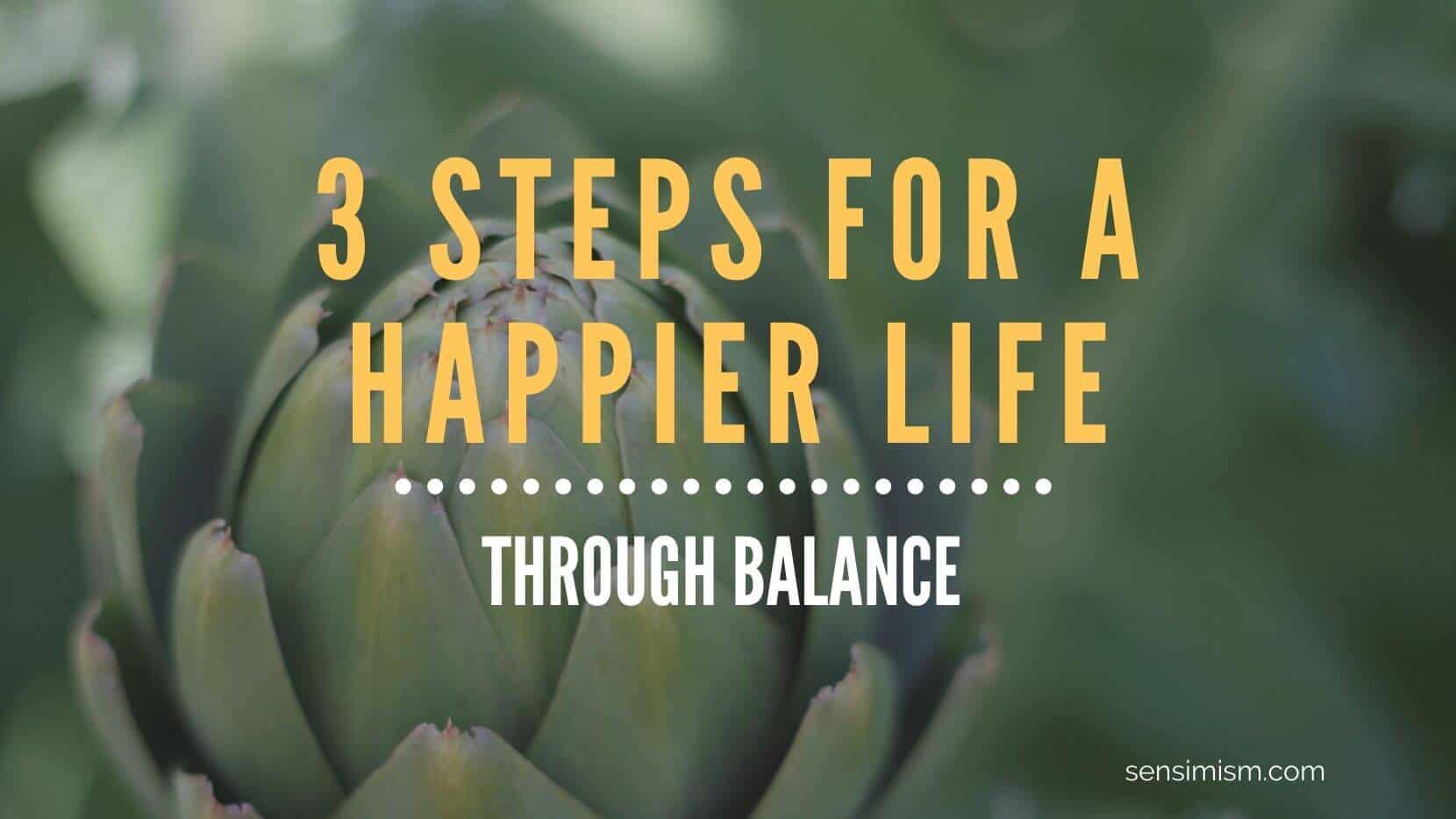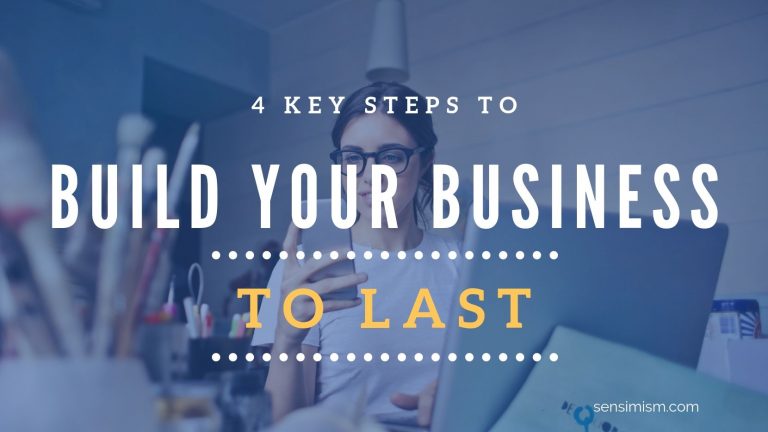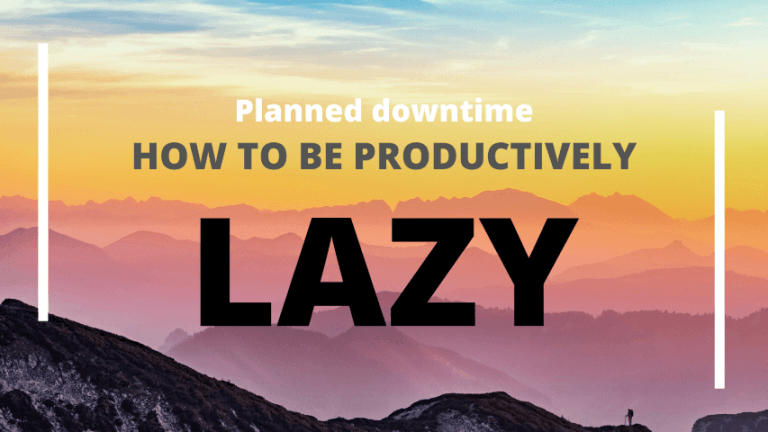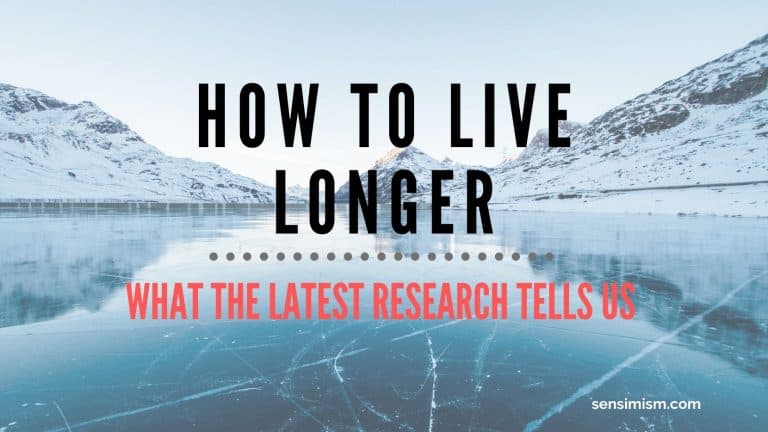Do this one thing for a happier life: aim for balance (3 steps to get you there)
What do you aim for in life? Career? Financial freedom? Freedom of time? Happy family? Leaving a legacy behind? Having a peaceful and blissful life?
You want to achieve your goals – great. You work hard on that, even better. But you also want to have a stress-free, peaceful and relaxed life, correct? Perfect. Have you noticed that these are usually not very compatible? Working hard on ambitious goals and a happy, peaceful life don’t exactly go hand in hand and we are often left drained, tired and grumpy.
It’s perfectly ok to want both – success and peace and quiet at the same time. This post will help you ease your mind by enabling you to achieve that.
Why is this important? You will be able to achieve more without sacrificing other elements in life to get there, without knocking yourself out, without burnout. You will get there thanks to slow, gradual, sustained and balanced effort, what sensimism is all about.
We all have goals. Even not giving a shit about a goal is a goal on its own: you aim to not care. You aim not to set goals that will give you more work or stress – that’s a goal of lowering your stress right there. Our goals can drive us to achieve great things. But they also drive us crazy, drain our energy and stress us out. We want both – the success, leaving a legacy, more money or recognition. We are bombarded by other people’s status and (apparent) success through social media. But at the same time, we want peace and quiet, have plenty of time to cuddle up on a sofa, read a book or watch Netflix. Or go travel, wander in a forest, build a cottage or just do nothing. Because it’s OK to be lazy (sometimes) – it can even be productive!
Sprinting vs jogging
How long can you sprint for? A hundred meters? Two hundred? Four hundred is considered maximum possible – but even before that we start going out of breath and lose momentum. And if you are not a professional athlete, you will max out probably at 50 meters. How is that relevant to this post? Think of working very hard on achieving your goal as a sprint. How long can you endure? When will you go out of breath?
Going out of breath doesn’t need to be a physical manifestation. It can show as mental tiredness, edginess, irritability towards closest ones. Or lack of energy to do other things – exercise, socialise – equally important to a happy life as achieving your goals.
If you go jogging, you can do that for hours. It’s still good for you, but it doesn’t knock you out, gasping for air, leaning towards the nearest lamp post. But it takes much longer to get somewhere.
But what if you balance sprinting with jogging? Sprint for a bit, then jog to catch your breath? You can move faster, but also have time to recharge.
First step towards a better balance in life is recognizing that you can’t go on full throttle all the time.
In the animal kingdom, even the fastest runners are not built to do that for long – antelopes or cheetahs. (That’s how hunters caught antelopes – they just jogged after them until the antelopes ran out of air and collapsed from exhaustion). And you’ll do well if you don’t try to go against nature or your own biology.
Neither can you race a car on full throttle for too long – it’s going to overheat and die on you.
Once you recognize and accept this, you will:
- no longer feel guilty, because you didn’t work 80 hours per week, like the 12 people in the world who all media focus on do
- no longer feel bad for allowing yourself to be lazy or recharging your batteries your way
- achieve more, because you will feel rested and your head will be clearer and more focused
- you might even earn more – countries with the lowest working hours are among the highest-earning ones
Get inspired by… a thermostat
Yes, a thermostat. What does it do? It creates a balance of temperatures. When it gets too hot, it turns the heating off, when it’s too cold, it turns it back on.
Do the same in your life – aim for balance – thermostat like. It’s ok to work hard if you balance it with enough time to rest and recover.
It helps knowing why you work hard:
- “I work hard 5 hours per day because it allows me to play / rest / do whatever I enjoy for the remaining hours”
- “I will work hard for the next two month to save enough to go and explore India for 3 months”
- “I work hard 5 days a week because it gives my family the best life I can offer them”
Don’t just work hard, because your boss tells you to or because others do or because it’s expected. Do it for your own reasons and know what they are.
Second step towards a better balance in life is recognising that the things we don’t like to do are also a part of life and they will not go away just because we want them to. Remember that some stress is good for you – that’s how you grow.
If you accept that we live in a world, where you have to exchange some of your time for money, it’s going to save you a lot of trouble. If you accept, that a long term relationship brings joy and support into your life but at the same time another person’s habits and needs, that you will have to take care of, you won’t stress about every relationship you have. Such is life – you can get the good things, but getting them either requires some sacrifice today, or they come with strings attached – always.
You want to live in a cottage by yourself and have peace and quiet once and for all? You will get lonely and crave being with people eventually. Love to be social and meet lots of people? It will tire you out and drain you eventually and you will want to shut the door to the world. Want to be a successful entrepreneur? Roll your sleeves up and start with the boring, hard work, that is required to get any business off the ground.
Anything in life is a balance of it’s good and bad things, things in life go up and down, they never remain a straight line. In a way, life has its own way to balance things (regression toward the mean), but it usually happens when it’s too late – your body shuts down if you work too hard (burnout), your muscles give in if you stress them too much (weight lifting – there is such thing as exercising too much – you stop building muscle). But some stress is needed for the muscle to grow – same applies in life – exposing yourself to some uncomfortable situations helps you grow, develop new skills, overcome fears. Don’t avoid the bad completely, but balance it out nicely with the good.
Do your balancing frequently
Balance is pointless if you do it over a too long period of time, say work your ass off for 5 years, then rest for 5 years. The damage will be done within the 5 years and you might never recover, even if you do nothing for the next 5 years.
- You can’t exercise for 30 days straight and expect the best results – with exercise, the best results are achieved also by an appropriate balance of rest and stress applied to muscles. It’s impossible to sustain either – too much of the bad stuff or too much of the good stuff. You can’t have absolute freedom, happiness or love – there will be ups and downs.
- You can achieve freedom in something (financial, time, place) and after exploring the entire world or lying on every white sand beach there is, you will crave doing something else, working, being productive – sacrificing your time (freedom) for something else.
- In love, you will find someone special and all things will be just amazing – the sex, the talks, the time spent together… until they won’t be. You will argue, you will make up. The sex will suck sometimes – she will want to, you will not. Even the best partner in the world will have his bad mood days. That’s ok.
There are no absolute measures in life – there’s only the right balance of both, the good and the bad.
Instead, frequently exchange between the negative (what is potentially hurting you – hard work, stress, pressure) and the positive (what you’d like to do more of). You choose the timeline based on how you prefer to relax, rest and balance things – do a lot of work and then rest in a single day, or in a week, or in a month. But do it consciously – know that you are working hard now, so you can switch off later and know when that later will be.
Third step towards a happier life is knowing when to stop and rest. Hint: sooner than we are told by media or people in the spotlight. Listen to your body – take a real break when tired.
Here’s another benefit – risk-taking. Once you accept that everything in life will pull you one way or another – you just have to learn to balance it, it will be easier for you to take risks (calculated risks). And what does risk-taking bring you? More opportunities, more skills, more experiences. Many great businesses wouldn’t be here if their founders haven’t taken a risk.
Summary
Whatever you do in life, always seek balance. Remember that:
- you can’t sustainably go on full throttle all the time. Stop and rest before you burn out.
- you can’t remove everything negative from your life – the good things always come with some bad things in tow. Accept it and don’t stress about it, just make sure the balance is right for you.
- Remember that some stress is needed for growth (exercise, going out of your comfort zone, pushing your self to do more – in a healthy way). You won’t grow on the sofa watching Netflix.
- stop and rest more often than you’re told – you can work hard better if you rest often. Work hard, rest hard 🙂
Everything in nature is also a balance – sun is great, but too much of it kills. Rain is great, but too much of it can be deadly. But the right balance of the two is perfect for life. Insects are essential for life on earth, but too many of them and they can devour the entire forest.
Every ecosystem has it’s own delicate balance, so does our internal one – our body. Why not create such balance in our innermost one – our mind? Achieve the right balance for yourself and you will lead a much happier life.
What now? You might want to check out these posts:
- How to be productively lazy
- Just walk – stay fit, happier and more creative
- One step to stop worrying
- How to cultivate good relationships






